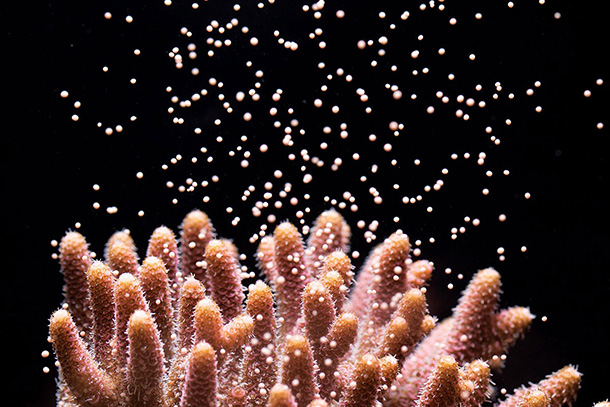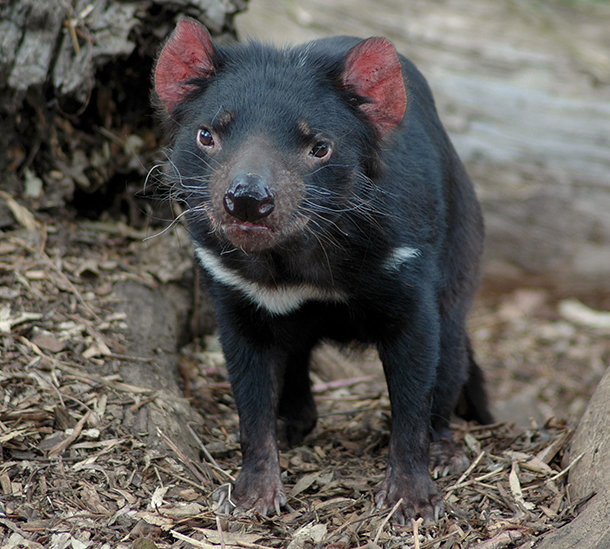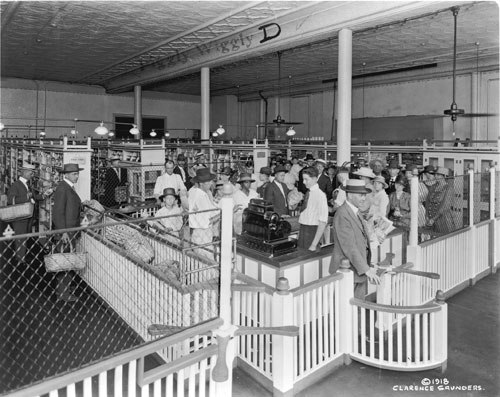Beyond The Headlines
Air Date: Week of September 9, 2016

In an effort to protect sensitive coral larvae, Hawaiian state legislators are considering a ban of sunscreens that use the chemical oxybenzone. (Photo: Penn State, Flickr CC BY-NC-ND 2.0)
In this week’s Beyond the Headlines, Peter Dykstra tells host Steve Curwood about bans on certain antibacterial soap and sunblock ingredients and some hope for the Tasmanian devil, which has been largely wiped out by a contagious cancer. In the history calendar, it’s 100 years after the opening of the first supermarket.
Transcript
CURWOOD: Let’s head beyond the headlines now with Peter Dykstra. Peter is with DailyClimate dot org and Environmental Health News, that’s e-h-n dot org and joins us from on the line from Conyers, Georgia. Hi, Peter.
DYKSTRA: Hi, Steve. Let’s start with three common consumer goods that may see big regulatory changes soon. First, the US Food and Drug Administration has banned antibacterial soaps containing triclosan, saying the chemical is no more effective than ordinary hand soap and may actually hold some risk as a potential endocrine disruptor.
CURWOOD: Hmmmm, well that’s been a very long battle.
DYKSTRA: Yeah, FDA first proposed a review of Triclosan back in 1978, but their decision last week isn’t the end, since it still allowed for use in some hand sanitizers, cosmetics, and even some toothpastes.
CURWOOD: Huh, toothpastes, so you won’t be able to put Triclosan on your hands, but you’ll still be able to put it in your mouth? What’s next?
DYKSTRA: Another long-running environmental battle – the UK government says it plans to ban plastic microbeads in consumer products by next year. The tiny plastic particles are turning up in the ocean and in fresh water, like the Great Lakes. They're ingested by marine creatures, creating a huge hazard.
CURWOOD: But haven’t a lot of companies voluntarily promised to stop using microbeads?

Tasmanian devil populations have been reduced by as much as 80% by a contagious cancer, but the discovery of populations with genetic resistance to the disease brings new hope for the species. (Photo: KeresH, Wikimedia Commons CC BY-SA 4.0)
DYKSTRA: Yeah, including Johnson & Johnson, who makes facial scrubs and body washes, and Procter & Gamble, who among other things makes Crest toothpaste, which for now still has microbeads in some brands but not Triclosan.
CURWOOD: Well that makes for some strong arguments for reading the ingredients before you buy. So you said you had three Peter, what’s the third one?
DYKSTRA: Oxybenzone is a common ingredient in some sunscreens. University of Hawaii researchers say it also stresses coral larvae – one more factor in the alarming decline in coral reefs. They say that on the island of Maui alone, enough oxybenzone washes off swimmers to fill a 55 gallon drum every day. So, state legislators are considering a ban of sunscreens that use oxybenzone.
CURWOOD: So no sunscreens at all on the sunny beaches of Hawaii?
DYKSTRA: No, there are alternatives that don't contain oxybenzone, said to be just as effective, that use zinc oxide or titanium oxide as the active ingredient.
CURWOOD: So what else do you have for us today?
DYKSTRA: There's some hope for an iconic, exotic animal threatened with extinction. Tasmanian devils have been blitzed by an epidemic of infectious cancer that they catch from each other by biting and that’s claimed as much as eighty percent of their population in recent years.
CURWOOD: Now over here, most people know the Tasmanian devil as Taz, the cartoon character.
DYKSTRA: Right, and Taz in the Warner Brothers cartoon is faithful to the real Tasmanian devils, but only to a point. The real ones have outsized heads and a ferocious growl and bite when feeding, but unlike the cartoons they usually walk on all fours and don’t whirl around like a tornado. They are also said to stink to high heaven.
CURWOOD: So what’s the good news for this animal that I'm not sure I want to really meet in person?
DYKSTRA: Researchers have found three separate devil populations whose genomes show an extra resistance to cancer, which shows up in the form of smothering facial tumors. It’s hoped that these populations can survive the cancer epidemic and keep the Tasmanian devil alive in the wild and not just in cartoons.

The original Piggly Wiggly store in Memphis, Tennessee, photographed in 1918 (Photo: Clarence Saunders, public domain due to copyright expiration)
CURWOOD: That's an interesting development. Hey, what's the anniversary you have for us this week?
DYKSTRA: Well when we think about ideas that have shaped modern life, there are the obvious ones like electricity, automobiles, the internet and a lot more. But 100 years ago this month, a grocer named Clarence Saunders had an idea that changed the way the vast majority of us get our food. Up until then, the standard in food shopping was that you’d write down a list, hand it to a clerk and the clerk would pick out your food for you. But in September 1916, Saunders opened his store, with the dignified name of “Piggly Wiggly,” in Memphis Tennessee.
CURWOOD: And thus the modern supermarket was born, huh?
DYKSTRA: Right, and this idea let Saunders run his store with fewer clerks.
CURWOOD: So today, some would call him a job-killer.
DYKSTRA: Perhaps, but it also spawned two more ideas – the shopping cart and also the bane of all weight-conscious consumers, impulse buying. Not to mention the first step toward today’s megamarkets, including hundreds of Piggly Wigglys all over the south, where you can get food from nearby farms or all over the world.
CURWOOD: Unless, of course, you live in a food desert with no quality food stores.
DYKSTRA: Right, and you can find those in just about any American city, too.
CURWOOD: Indeed, you can. Peter Dykstra is with Environmental Health News, that's EHN.org and DailyClimate.org. Thanks, Peter and talk to you again soon.
DYKSTRA: Thanks, Steve
CURWOOD: And there's more on these stories at our website, loe.org.
DYKSTRA: That's all, folks!
Links
ABC: “Oxybenzone in sunscreen is damaging coral reefs”
STAT News: “FDA bans antibacterial soaps containing triclosan”
BBC: “Plastic microbeads to be banned by 2017, UK government pledges”
New York Times: “New Hope for Tasmanian Devils in Fight Against Contagious Cancer”
Living on Earth wants to hear from you!
Living on Earth
62 Calef Highway, Suite 212
Lee, NH 03861
Telephone: 617-287-4121
E-mail: comments@loe.org
Newsletter [Click here]
Donate to Living on Earth!
Living on Earth is an independent media program and relies entirely on contributions from listeners and institutions supporting public service. Please donate now to preserve an independent environmental voice.
NewsletterLiving on Earth offers a weekly delivery of the show's rundown to your mailbox. Sign up for our newsletter today!
 Sailors For The Sea: Be the change you want to sea.
Sailors For The Sea: Be the change you want to sea.
 The Grantham Foundation for the Protection of the Environment: Committed to protecting and improving the health of the global environment.
The Grantham Foundation for the Protection of the Environment: Committed to protecting and improving the health of the global environment.
 Contribute to Living on Earth and receive, as our gift to you, an archival print of one of Mark Seth Lender's extraordinary wildlife photographs. Follow the link to see Mark's current collection of photographs.
Contribute to Living on Earth and receive, as our gift to you, an archival print of one of Mark Seth Lender's extraordinary wildlife photographs. Follow the link to see Mark's current collection of photographs.
 Buy a signed copy of Mark Seth Lender's book Smeagull the Seagull & support Living on Earth
Buy a signed copy of Mark Seth Lender's book Smeagull the Seagull & support Living on Earth

